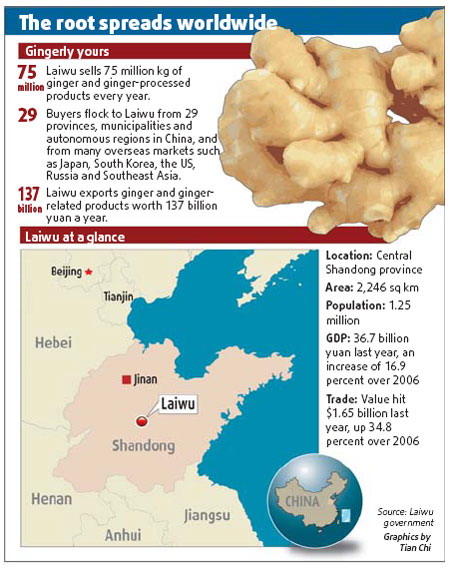
|
CHINA> Focus
 |
|
A pioneer in land-use rights reform
By Wang Zhuoqiong (China Daily)
Updated: 2008-11-21 08:40  The result: by 2008, about 80 percent of villagers had transferred their land-use rights. "Some of those who have not done so are now eager to join," Liu says. So much has changed that Li is now the leader of a team of 40 farmers growing ginger. The 600,000 yuan ($87,841) the company paid to the village committee as management fee for the transfer "has solved many problems", says 45-year-old Jia. The village committee used the money to pay for road construction, tree-planting and other projects. There are two marked changes in the village, Jia says. With a rise in farmers' income, disputes among villagers, all too common earlier, have become fewer. And vendors' business is booming. "When people have extra money, they buy things So snack vendors and fruit-sellers see their products being sold in no time."
The Laiwu company has acquired about 180 hectares of land in Gongjiazhuang and three other villages. Last year, it produced about 30,000 tons of ginger and 50,000 tons of garlic. But raising output is not its only goal, for it pays equal attention to food safety and product quality. "If chemical fertilizer is sprayed on a plot, not only the ginger, but also the soil will be ruined," Liu says. The 44-year-old started a pilot food safety project with the Laiwu municipal government after he was laid off from a local government-affiliated foreign trade company. "If you want to get into the foreign market, there is only one thing to do - meet their quality standards," he says. The company has set up a lab at the cost of 20 million yuan, and built a duck-breeding farm to make its own non-chemical fertilizer. Growing ginger may not be a difficult exercise, but the method followed, fertilizer and seeds are vital in large-scale farming to guarantee food safety, Liu says. That's precisely why he has hired about 20 technical personnel to train the farmers in the art of growing more and healthy ginger. Since the company is also cost-conscious, it pays the village committee to find capable persons to lead the farmers' teams. "That saves us from hiring extra hands also, the leaders know the capabilities of the team members because they are from the village, too," Liu says. "But the committee has a say in employment and appraisal." The success of Gongjiazhuang will take time to be spread across the country. Han, of the State Council DRC's rural economy department, says it could take decades given the size of the country and the population in rural areas. The key to the reform is strengthening farmers' rights - the guarantee of voluntary transfer and ownership of profit. Plus, the government has to ensure that after the right to use a farmland is transferred, the person or company acquiring it uses it strictly for farming. Since land-use rights transfer is market-oriented, the role of the government should be as a rule maker, a watchdog and service provider, instead of a participator, Han says. If the country wants to ensure the food security then it is very important that a fixed area for grain farming is mapped out and non-farming industries are prevented from setting up plants in that area. Back in Gongjiazhuang, where a successful beginning has been made, farmers are becoming restless. They are now free because they don't have to till their farmland and are looking for work to earn some extra money. Forty-five-year old Liu Zhengcui juggles between home and the forage processor factory the family runs. She is raising some rabbits at home, too. Earlier, Liu's husband used to move to the city to work as a construction worker. But now, she says, he may not have to do so. Why? Is the family making that much extra money after transferring its land-use rights? Liu, a tall and slender woman, doesn't answer. But her smile says it all. |
||||
主站蜘蛛池模板: 久久免费视频精品| 免费能直接在线观看黄的视频| 88av在线播放| 好男人www在线视频高清视频| 久久久精品一区| 最近最新中文字幕| 亚洲欧美日韩中文字幕一区二区三区| 粗大挺进尤物人妻中文字幕| 国产ts最新人妖在线| 黄网站色视频免费看无下截| 国产精品久久久久影院| 99热在线观看免费| 狠狠色丁香九九婷婷综合五月| 国产三香港三韩国三级不卡| HUGEBOOBS熟妇大波霸| 成年网在线观看免费观看网址| 久久精品一区二区东京热| 欧美a级黄色片| 亚洲欧美另类在线观看| 男操女视频网站| 又爽又黄又无遮挡的视频在线观看| 野花国产精品入口| 国产成人精品一区二三区在线观看| 120秒男女动态视频免费| 国内精品久久久久久99蜜桃| japanese日本熟妇多毛| 山村乱肉系列h| 中文japanese在线播放| 无翼乌邪恶工番口番邪恶| 久久无码精品一区二区三区| 日韩色日韩视频亚洲网站| 亚洲一区二区三区免费| 欧美午夜理伦三级在线观看 | 手机看片国产在线| 久久亚洲国产精品五月天婷| 日本高清视频在线www色| 久青草国产97香蕉在线视频| 最近免费中文在线视频| 亚洲AV永久无码精品表情包| 模特冰漪丰硕之美1| 亚洲va久久久噜噜噜久久狠狠|